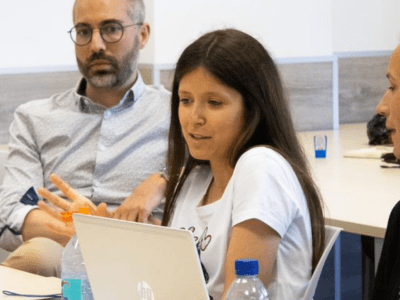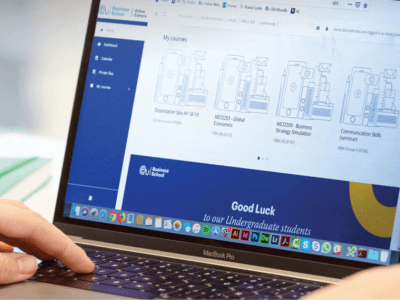You might have noticed the paradigm shift in our work spaces. A traditional degree is no longer looked upon as a badge to denote your skill and potential as a professional. Rather, it is an imperative for the job market. Those that do not have at least a master’s degree find themselves fighting for jobs that were originally intended as entry level positions. And the biggest companies are moving in the direction of upskilling their employees. Why? Many businesses have found that educated employees are better prepared to think critically, problem solve and innovate. In addition, having educated employees has become a competitive weapon. Quality worker performance has become the key to overall business success.


Having an edge
For many of us, although we might be interested in obtaining a master’s degree, we find ourselves in a situation where we would be placed in the ‘non-traditional’ student category. We are over 25 years old, work full-time and may already have a family. It is next to impossible to take time off work to ‘go back to school’. Or dedicate the hours necessary to attend classes and guest lectures. Not to mention the social pressures of being on a campus, often in the midst of a younger generation of students. But to be considered for a better position, to change careers or even to solidify the success of an already successful career, you need to have an edge.
Distance learning has proven to be the solution for non-traditional students, offering a flexible way to work and study at the same time. It’s no surprise that the number of online learners has grown in recent years and is projected to grow even more. We need to ask ourselves: is distance learning the key to success of the non-traditional student in higher education?
Time and money
According to a study by Barnes and Noble College, the primary concern of non-traditional students is the price of tuition. Most non-traditional students take out loans or find third party scholarships and grants to help cover the costs. But it could be an economic strain, especially if you have a family depending on you. For those investing in education, however, the results of obtaining a degree are notable. In a study of Return of Investment by QS, they found that EU Business School graduates enjoy a 138% salary uplift after graduating. They also found that a medium amount of time a student needs to find a job (if they did not already have one) is six months.
Additionally, distance learning is generally more economic, considering there are no commuting expenses, no accommodation costs and no living expenses. The cost of your education is the only thing you pay for.


An education revelation
The flipped classroom model of a distance learning program focuses on actual learning rather than lecture. The student studies, reads the materials, does the assignments, and then solidifies this knowledge with their professor and colleagues. They can then build upon that knowledge in the interactive online classroom. This leaves students to learn as much as their interest or needs propel them. They can then learn at a convenient time. Whether that is in the morning before work, after work, or on the weekends. The result is a more flexible learning schedule.
The Barnes & Noble study found students were initially concerned with a lack of social connection with their peers. But working in an online format means that every student is on the same learning field. There are no prejudices of age or background. We are taken for what we know, and for our ideas and knowledge that we share. It is important to have a strong online community where professors and colleagues are as connected as they wish and need to be.
On campus weeks
The blended component of the online program strengthens this connection. On-campus weeks gives students chance to meet your colleagues and peers face-to-face. This solidifies relationships already forged through forums and messages. EU Business School hosts three on-campus weeks: in Geneva, Munich and Barcelona. Students are required to attend one of these three-week long events. Many have progressed to make key connections with like-minded individuals in the business world.


Tomorrow’s leaders
The advantages of an online education are many, but the real key to a non-traditional student’s success is their own determination and personal responsibility. Online students at EU Business School obtain their degrees as professionals, capable of decision-making, problem-solving and thinking creatively. This prepares them to be dynamic leaders, successful leaders, ready to push boundaries and shape the business world.









